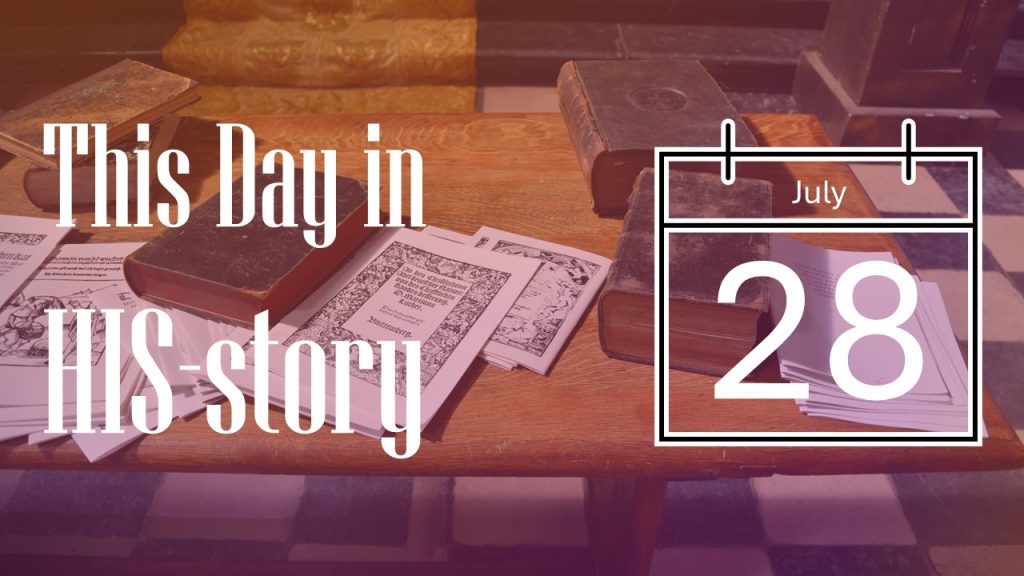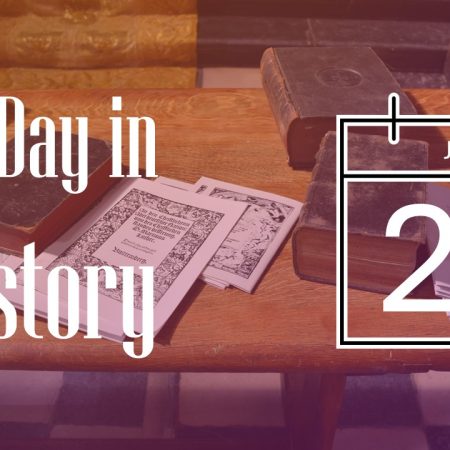
1881
J Gresham Machen was born into southern aristocracy in Baltimore, Maryland on this day, July 28, 1881. Through inheritances, he became wealthy as a young man. At one time and another, his grandfather on his mother’s side and his own father each left him $50,000 in a day when a family could live well on $3,000 a year. His financial circumstances freed him to study in Europe and later to support Christian publications and Christian work.

But his family left him more than money. They gave him an inheritance of Southern views, social connections and solid achievement. His cultured mother was from Macon, Georgia and published a book titled The Bible in Browning when J. Gresham was 22. His father was a successful lawyer from Baltimore. Woodrow Wilson was a friend of the family.
J. Gresham was reared Presbyterian. Schooled in the Westminster Confession and the Bible, he would later say that at twelve he had a better understanding of the Scripture than many older students entering seminary.
Although he is known as a conservative champion of traditional Calvinism against modernism, under the influence of German liberals he almost became a liberal himself. In the end, his conviction that the Bible was true and his assurance that Christ lives today, made him an ally of the fundamentalists, a group who held to certain “fundamental” truths. He was ordained in 1914, after discovering that Christ “keeps a firmer hold on us than we keep on him.”
J. Gresham’s battles against modernism were mostly waged at Princeton Seminary. He insisted that Modernist Christianity and Bible Christianity were two different religions. As the Presbyterian Church in the U.S.A. began to adopt Modernist ideas he fought the drift. Typical Modernists doubted the truth of the Resurrection of Christ, forsook the Virgin Birth, and were skeptical of miracles and of the Bible’s accuracy. On the other side, J. Gresham defended all these things.
His most famous book was The Virgin Birth of Christ. In it he answered objection after objection. He began by showing that the doctrine was very old and that differences in Matthew and Luke could be reconciled. He argued that the virgin birth was a crucial element of the whole story of Jesus: “Remove the part and the whole becomes harder not easier to accept; the New Testament account of Jesus is most convincing when it is taken as a whole.”
Eventually J. Gresham Machen felt that to be consistent, he had to leave Princeton. He founded Westminster Seminary to reclaim truths that he saw being thrown away. Next he formed the Independent Board for Presbyterian Missions because some Presbyterian missionaries (such as Pearl S. Buck) made statements that watered down faith in Christ. He was suspended from the ministry for creating this schism. So he founded the Presbyterian Church of America, known today as the Orthodox Presbyterian Church.
He died of overwork in 1936, preaching and traveling right up to the day before he died.
1979
IN 1978, Ethiopia’s Marxist Derg regime arrested church leader Gudina Tumsa and interrogated him for a month before releasing him. In June 1979, they arrested him again, and held him for three weeks, threatening torture. He said torture would make no difference: He had to speak truth. Friends arranged asylum for him in Tanzania. Gudina* replied, “How can I, as a church leader, leave my flock at this moment of trial? I have again and again pleaded with my pastors to stay on.” He quoted 2 Corinthians 5:15: “Christ died for all that those who live should no longer live for themselves but for him who died for them and was raised again.”
An Oromo (Western Ethiopian), Gudina evangelized in his homeland. He began his studies of theology at the Swedish Evangelical Mission. Later, he deepened his understanding at Luther Seminary in St. Paul, Minnesota, in 1963 through 1965. By the time he went to Minnesota, he was married to Tsehay Tolessa, an evangelist in her own right.
Gudina became internationally-known for the Ethiopian theology he developed. His holistic theology addressed both the physical and the spiritual needs of his people. He stressed the importance of holy living; of participation in, and suffering with, Christ; and of the interdependence of the entire world church. He also pondered when the church should, and should not, resist tyrants.
Ethiopian Marxists overthrew Emperor Haile Selassie. They viewed life through secular eyes and distrusted the church. Because Gudina was General Secretary of the Ethiopian Evangelical Church Mekane Yesus, they kept him in their sights. Gudina was at the forefront of an ecumenical alliance, the Council for Cooperation of Churches in Ethiopia, and served as its first chairman. In face of political persecution, he knew churches needed a united voice. Although the Derg claimed they wanted church unity, they did not approve Gudina’s version.
On this day, 28 July 1979, Marxist Dergs seized Gudina for a third time as he headed home from teaching a Bible study. For years no one knew what had become of him. Not until after the Derg regime fell in 1991 did a soldier reveal that the captors had strangled Gudina the night of his arrest. The soldier led inquirers to Gudina’s burial site. Friends exhumed the body, verified it was his, and gave him a funeral the following year.

Gravestone of Mekane Yesus general secretary Gudina Tumsa. Courtesy of David Castor (user:dcastor) / public domain, Wikimedia
Because of Gudina’s profound theology and the parallels between his experience and Dietrich Bonhoeffer’s, he is sometimes known as “the Ethiopian Bonhoeffer.”
Meanwhile Tsehay suffered even worse at the hands of the Derg.† They held her in disgusting prison conditions and tortured her again and again over the course of a decade. She survived to live to be eighty-four. She often scooted herself around on the floor because standing and walking was painful for her.
* Ethiopians take their father’s names as surnames, so it is more appropriate to call them by their given names than by their surnames.
† Tsehay’s story is told at our sister site, Captive Faith. TSEHAY TOLESSA (D. 2014) ENDURED A DECADE OF TORTURE IN ETHIOPIA
